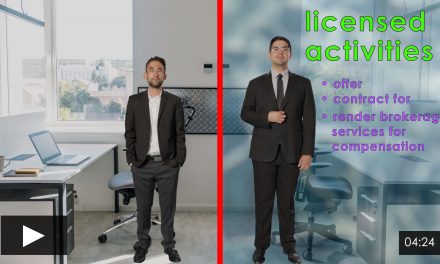This article is part of an ongoing series covering violations of real estate law. Here, the Department of Real Estate (DRE) revoked the real estate license of a real estate corporation, later leading the designated officer to voluntarily surrender their broker license, for allowing an unlicensed employee to solicit and contract with their principal, and failing to disclose a conflict of interest.
In June 2022, the California Department of Real Estate (DRE) decided by default decision to revoke the license of Outfit Realty, Inc. (ORI), a real estate corporation since 2008 operating out of Ontario, California. The decision became effective September 2022.
Richard Joseph Minogue was the designated officer of ORI since 2017. As designated officer, Minogue was required to comply with stringent supervision requirements of all licensed and unlicensed staff. In October 2022, Minogue surrendered their broker license in connection with the disciplinary action taken against ORI.
David Garza, an unlicensed broker assistant and CEO of ORI, solicited a distressed homeowner, offering them foreclosure assistance.
When the owner met with Garza and Minogue, Garza pivoted the conversation away from foreclosure assistance and towards selling the owner’s property in a short sale.
The owner agreed and entered into a Residential Listing Agreement, giving ORI and Minogue the exclusive right to sell their property from May 2019 to May 2020. The listing price was set at $600,000. [See RPI Form 102]
Despite Minogue’s duty to supervise the activities of their staff to ensure compliance with real estate law, Minogue allowed Garza to communicate and negotiate with the owner about potential buyers, terms of the sale, offers and costs — all real estate activities requiring a real estate license. [Calif. Business and Professions Code §§10130 and 10137]
In June 2019, a business associate of ORI and Garza, John Thomas, LLC, through John Refaat Habashy, a broker, submitted a Notice of Default Purchase Agreement to purchase the owner’s property for $525,000 in a short sale arrangement.
Garza, ORI and Minogue recommended the owner sell the property to John Thomas, LLC. Despite Minogue’s fiduciary duties to the owner as the owner’s exclusive agent, at no time did Minogue inform the owner of the business relationship ORI had with Habashy — a conflict of interest.
In June 2019, the owner accepted John Thomas, LLC’s offer of $525,000. The owner’s mortgage holder agreed to and accepted the payoff amount. In July 2019, escrow closed and the property was sold to John Thomas, LLC for $525,000. A conflict of interest disclosure was never given to the owner informing them the buyer was a business associate of the brokerage, denying the owner the opportunity to take this relationship under advisement when considering the merits of the offer submitted. [See RPI Form 527]
Related Video: Word-of-the-Week: Conflict of Interest
Click here for more information on an agent’s conflict of interest.
Further, throughout the transaction, Minogue failed to exercise reasonable supervision and control over the licensed activities of ORI and its employees and associates, including Garza, to ensure full compliance with real estate law and DRE regulations. [Bus & P C §§10159.2 and 10177(h); DRE Regulations §2725]
Fundamentally, Minogue allowed the unlicensed assistant Garza to brazenly conduct all sorts of licensed activities. These actions constitute making substantial misrepresentations, fraud and dishonest dealing, and are cause for the suspension or revocation of the license and all license rights of ORI and Minogue. [Bus & P C §§10177(g), 10177(j) and 10176(a)]
Fiduciary duty of utmost loyalty — forever and always
Brokers are in a distinctly different category from sales agents.
Brokers are authorized to deal with members of the public to offer, contract for and render brokerage services for compensation, called licensed activities. Sales agents are not. [Bus & P C §10131]
Only when acting as a representative of the broker may the sales agent perform brokerage services which only the broker is authorized to contract for and provide to clients. [See RPI e-book Real Estate Practice, Chapter 1]
The broker’s duties they owe to various parties in a transaction, which may be carried out by a sales agent under the employing broker’s continuing supervision, oversight and management, include:
- the utmost care, integrity, honesty and loyalty in dealings with a client; and
- the use of skill, care, honesty, fair dealing and good faith in dealings with all parties to a transaction in the disclosure of information which adversely affects the value and desirability of the property involved. [Calif. Civil Code §2079.16]
Related Video: Brokerage Activities: Agent of the Agent
Click here for more information on licensed activities for brokers and agents.
Further, a broker needs to disclose a conflict of interest, whether patent or potential, at the time it occurs or as soon as possible after the conflict arises. Typically, the conflict arises prior to providing property information to a buyer or taking a listing from a seller. [See RPI Form 527]
The disclosure creates transparency in the transaction. It reveals the broker’s bias to the client which, when disclosed, allows the client to take the bias into consideration in negotiations. [See RPI e-book Real Estate Principles, Chapter 4]
The disclosure and consent does not neutralize the inherent bias itself. However, it does neutralize the element of deceit which breaches the broker’s fiduciary duty when left undisclosed.
A conflict of interest arises and is disclosed to the client when the broker:
- has a pre-existing relationship with another person due to kinship, employment, partnership, common membership, religious affiliation, civic ties, or any other socio-economic context; and
- that relationship might hinder their ability to fully represent the needs of their client.
Related Video: Analyzing a Conflict of Interest
Click here for more information on disclosing a conflict of interest.
Related article:
DRE Hot Seat: The buck stops with the designated broker — always
Want to learn more about broker supervision and disclosure requirements? Click an image below to download the RPI book cited in this article.
















